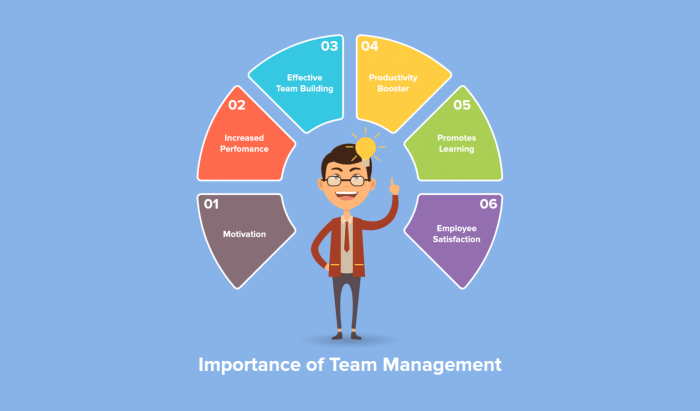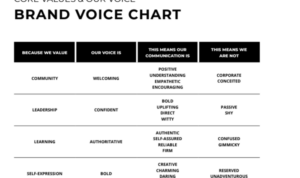Team Management Skills, crucial in any professional setting, can make or break a project’s success. From communication to motivation, these skills are the foundation of a thriving team dynamic.
Importance of Team Management Skills
Team management skills are crucial in a professional setting as they play a significant role in ensuring the success of projects and businesses. Effective team management skills can lead to improved collaboration, communication, and productivity among team members.
Impact on Project Success
Effective team management skills can impact the overall success of a project by ensuring that tasks are delegated efficiently, deadlines are met, and resources are utilized effectively. When a team is well-managed, it can lead to better outcomes and increased project success rates.
Contribution to Positive Work Environment
Team management skills contribute to a positive work environment by fostering a sense of trust, respect, and camaraderie among team members. When team leaders are able to effectively manage their teams, it creates a supportive and motivating atmosphere that encourages collaboration and creativity.
Improvement of Employee Morale and Productivity
Team management skills can improve employee morale and productivity by providing clear goals, expectations, and feedback to team members. When employees feel supported and valued by their team leaders, they are more likely to be motivated to perform at their best and contribute positively to the team’s overall success.
Essential Team Management Skills

Effective team management requires a diverse set of skills to ensure smooth collaboration and productivity. Key team management skills include communication, conflict resolution, delegation, and motivation. These skills are crucial for fostering a positive work environment and achieving team goals.
Importance of Active Listening
Active listening is a critical skill in team management as it involves fully engaging with team members to understand their perspectives, concerns, and ideas. By actively listening, managers can build trust, enhance communication, and resolve conflicts more effectively. It shows respect for team members and encourages open dialogue, leading to better collaboration and problem-solving.
Role of Effective Delegation
Delegation is essential in team management as it involves assigning tasks and responsibilities to team members based on their strengths and expertise. Effective delegation empowers team members, promotes skill development, and ensures tasks are completed efficiently. It also allows managers to focus on strategic decision-making, leading to increased productivity and team performance.
Strategies for Motivating Team Members
Motivating team members is crucial for maintaining high morale and achieving team objectives. Some strategies for motivating team members include recognizing and rewarding achievements, providing opportunities for growth and development, fostering a positive work culture, and encouraging open communication. By creating a supportive and engaging work environment, managers can boost team morale, increase job satisfaction, and drive overall team success.
Developing Team Management Skills

Developing team management skills is crucial for effective leadership and collaboration within a team. By improving communication, conflict resolution, delegation, and fostering a positive team culture, leaders can enhance team performance and achieve common goals.
Improving Communication Within a Team
Effective communication is key to successful team management. Here are some tips to improve communication within a team:
- Encourage open and transparent communication among team members.
- Active listening is essential to understanding team members’ perspectives and concerns.
- Utilize various communication channels such as meetings, emails, and collaboration tools.
- Provide constructive feedback to ensure clarity and alignment on tasks and goals.
Enhancing Conflict Resolution Skills as a Team Leader
Conflict is inevitable in any team setting, but how it is managed can make a significant difference. Here are ways to enhance conflict resolution skills as a team leader:
- Address conflicts promptly and directly to prevent escalation.
- Encourage open dialogue and facilitate constructive discussions to find mutually beneficial solutions.
- Promote empathy and understanding to resolve conflicts with a focus on team harmony and productivity.
- Seek training or professional development opportunities to improve conflict resolution techniques.
Effective Delegation and Task Assignment
Delegating tasks efficiently is essential for effective team management. Here are techniques for effective delegation and task assignment:
- Understand team members’ strengths, weaknesses, and interests to assign tasks accordingly.
- Set clear expectations and deadlines for delegated tasks to ensure accountability.
- Provide necessary resources and support to empower team members to complete their tasks successfully.
- Regularly follow up on delegated tasks to track progress and offer assistance when needed.
Cultivating a Positive Team Culture Through Leadership and Motivation, Team Management Skills
A positive team culture fosters collaboration, engagement, and innovation. Here’s how to cultivate a positive team culture through leadership and motivation:
- Lead by example and demonstrate positive behaviors and attitudes that inspire team members.
- Celebrate successes and recognize team achievements to boost morale and motivation.
- Promote a sense of belonging and inclusivity within the team to enhance collaboration and trust.
- Provide opportunities for professional growth and development to keep team members motivated and engaged.





